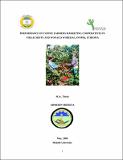| dc.description.abstract | People form cooperatives to do something better than they could do individually or through a Cooperative form of business. Forming a cooperative will not automatically solve business problems faced by individual households. This is because cooperatives are subject to the same economic forces, legal restrictions and international relations that other business face. Cooperative members’ expectations about the types and quality of services that should be offered and their criteria for performance of these services have a major impact on the level of satisfaction or dissatisfaction felt. Members’ satisfaction on the benefits obtained by establishing cooperatives should be evaluated by the level of the deviation of service expectation from perceived service performance. Thus, cooperatives’ performance should be continuously checked against the level of members’ satisfaction. This study therefore, aims at assessing the performance of primary coffee marketing cooperatives and there by to identify factors that impede members’ satisfaction, and to evaluate the performance of coffee marketing cooperatives in the study area, Financial ratios were computed based on annual audit reports of the cooperatives. Here, efficiency ratios, income ratios and creditworthiness ratios were calculated as performance indicators. The result reveals that, almost all the coffee marketing cooperatives in the study areas were performing their business inefficiently. Probit regression model was also employed to identify factors influencing the members’ satisfaction, the adequacy and context of services rendered by the cooperatives, and the major services as function and of socio-economic and institutional explanatory variables. The model analysis revealed that, age, family size, terms of payment for red cherry and dry cherry were found to be statistically significant at significance level of 5%, 5% 1% and 5% respectively which influenced negatively except the terms of payment for dry cherry which influenced positively. The satisfaction of members’ of the coffee marketing cooperatives in the study areas was found to be poor with reference to the over all performance of the cooperatives. | en_GB |


